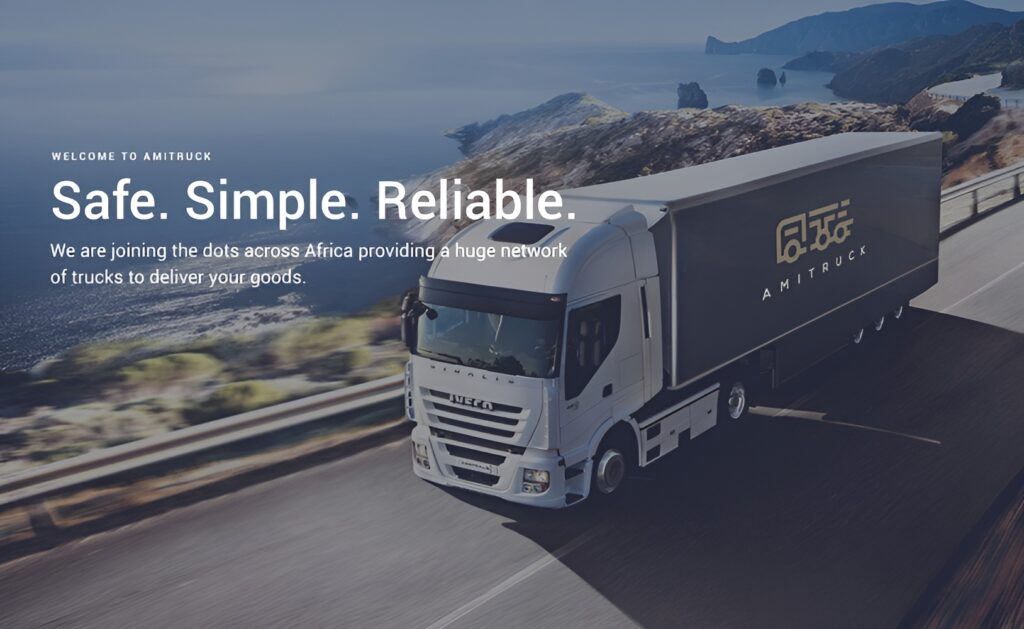Image Credits: Amitruck
What is Amitruck?
Amitruck is a trucking logistics marketplace offers a digital platform that connects startups like Twigga Foods, Jumia, or DHL who are looking to ship goods with independent transporters who operate trucks, vans, pickups, and motorbikes, and in some cases, fleets of such transports.
Amitruck came into existence when the Mwangi brothers (Mark and Timothy) launched the startup in Kenya to tackle the disruption of business operations caused by challenges in Kenya’s road transport.
At the moment, Amitruck boasts of a database of over 8,000 vehicles, which have in over the years completed almost 100,000 deliveries for more than 300 corporate clients. At the same time, it ramped up revenue by 1,000 percent in 2021. With the African trucking and logistics market now accounting for almost 80% of transport goods, the startup is now kicking off plans for market dominance.
The Upwork of Shipping and Logistics Services: How Amitruck Works
Amitruck’s online platform allows shippers to post requests on the platform, while transport outfits propose offers based on competitive pricing. The whole process occurs in the following stages:
- •The client asks for a delivery on the app and present the products that need to shipped. To make things easier, the client should indicate the following on his application:
- Where to pick-up the delivery
- The delivery dates
- Where to drop-off the delivery
- The name of the company or the recipient
- The type and the size of vehicle
- Specific information about the delivery
- •The most adapted transporter makes a commercial proposition via the application.
- •The client selects the desired option.
- •Both the client and the transporter get in touch and define a pick-up date.
- •Once the delivery is done and validated by the client, the transporter gets directly paid on the application.
The platform also allows shippers customize services, for example, to add off-loading charges. The platform includes a transporter’s rating and the mean number of trips made. These sets of data enables shippers narrow down their choices. Also, the technological solution also enables customers to track the journeys and thus guarantee the security of the shipping.
At the moment, Amitruck is in partnership with independent transporters, including truck drivers who also own their trucks and who mostly work within the informal sector. It also collaborates with professional fleets of transporters, owing one or several vehicles.
Funding
In 2021, Amitruck managed to close an undisclosed pre-seed investment from American investors Dynamo Ventures and Plug and Play Ventures. In that same year, Amitruck was earmarked to join the sixth cohort of Google for Startups Accelerator: Africa. Still in 2021, the logistics company got an equity-free cash award from the Google for Startups Black Founders Fund, which helps Black-led startups in Africa, Brazil, Europe, and the United States secure funding, strengthen communities, and create generational change.
In 2022, Amitruck secured $4 million in seed funding in a round led by Better Tomorrow Ventures (BTV), with the participation of Dynamo Ventures, Rackhouse Venture Capital, Flexport Inc, Knuru Capital, Launch Africa Ventures, Uncovered Fund, and a number of angel investors.
A Word From The Founder
In describing the team’s growth trajectory, Mark Mwangi said, “We were no different from any other startup. The team had to work really hard to get our startup off the ground. The idea came from talking to family members in the cement business and finding out about the inefficiency in trucking. The complaints around middlemen and how they would frequently misinform truck owners, customers and often didn’t pay or help if something went wrong. For example if the load was damaged or stolen. So I spent a few months touring the “trucking” areas in and around Nairobi, talking with truckers, customers and trying to understand what was really going wrong.
Shortly after that we started to build our MVP and in Feb 2019 we put the first product out. We were bootstrapped for well over a year to start with. I think the key value addition was bringing trust and transparency to the transportation of goods and the way in which those transactions happen. We could see that the level of trust had really been eroded, primarily we concluded this was due to the untrustworthy middlemen connecting transporters and cargo owners. Later on we came to understand just how big this issue was.
Frequently we find that up to 70% of the cost of goods sold in Africa is the cost of logistics and specifically transport, which is primarily by road in Africa. The value creation here became connecting transporters and cargo owners in a transparent, secure and efficient manner.”

